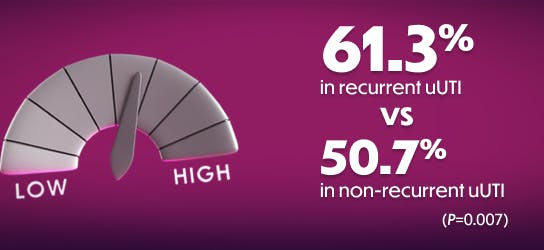
Explore the full impact uUTI can have on your patients
Symptoms associated with uncomplicated urinary tract infection (uUTI) can disrupt the daily lives of your patients.
uUTI symptoms can have a considerable negative impact on your patients’ physical and emotional well-being. In addition, recurrent or resistant uUTIs can increase patients’ burden of infection as a cycle of infections and symptoms can persist.1,2

Explore the full impact uUTI can have on your patients
Symptoms associated with uncomplicated urinary tract infection (uUTI) can disrupt the daily lives of your patients.
uUTI symptoms can have a considerable negative impact on your patients’ physical and emotional well-being. In addition, recurrent or resistant uUTIs can increase patients’ burden of infection as a cycle of infections and symptoms can persist.1,2

uUTI impact on patients
Listen to a real patient talk about her uUTI
For women with uUTI, the burden can be considerable
A cross-sectional, online survey of 375 women who self-reported a uUTI episode in the past 60 days treated with ≥1 oral antibiotic assessed activity impairment associated with uUTI.
Survey results showed*,1:

Impaired sleep was common,
Participants with recurrent uUTI had greater overall work productivity loss and higher daily activity impairment than those with non-recurrent uUTI:

Overall work impairment associated with the participant's most recent uUTI was:
Impairment expressed as percentage: higher percentage indicates greater impairment/less productivity.

Reported impact on daily activities associated with the participant's most recent uUTI:
Impact expressed as percentage: higher percentage indicates greater impact/less productivity.
A cross-sectional, online survey of 375 women ≥12 years of age in the US who self-reported a uUTI episode in the past 60 days treated with ≥1 oral antibiotic assessed activity impairment associated with uUTI. Survey was completed over a 2-month period. Participants were excluded if they self-reported a diagnosis with symptoms indicative of complicated UTI. Primary objective of the study was to assess activity impairment associated with uUTI. Secondary endpoints included assessment of health-related quality of life and workplace productivity.1
uUTI can negatively impact patients’ peace of mind†,2
Patients with uUTI or recurrent uUTI reported the following†:
“Hamster wheel” effect of continually suffering and visiting the doctor
“Hamster wheel” effect of continually suffering and visiting the doctor
Frustration with yet another uUTI impacting their life and routine
Frustration with yet another uUTI impacting their life and routine
Worry that an underlying issue is hindering successful management or causing recurrence
Worry that an underlying issue
is hindering successful management or causing recurrence
Dread and anxiety due to the anticipation of another uUTI
Dread and anxiety due to the anticipation of another uUTI
A qualitative, exploratory, in-depth interview-based study of 65 females, aged ≥18 years across the US and Germany who had at least one uUTI in the past year that was treated with an antibiotic. A minimum of 50% of participants selected globally had experienced recurrent uUTIs, defined as ≥3 uUTIs in the past year.2
- Thompson J, Marijam A, Mitrani-Gold FS, Wright J, Joshi AV. Activity impairment, health-related quality of life, productivity, and self-reported resource use and associated costs of uncomplicated urinary tract infection among women in the United States. PLoS One. 2023;18(2):e0277728.
- Grigoryan L, Mulgirigama A, Powell M, Schmiemann G. The emotional impact of urinary tract infections in women: a qualitative analysis. BMC Women's Health. 2022;22(1):182.